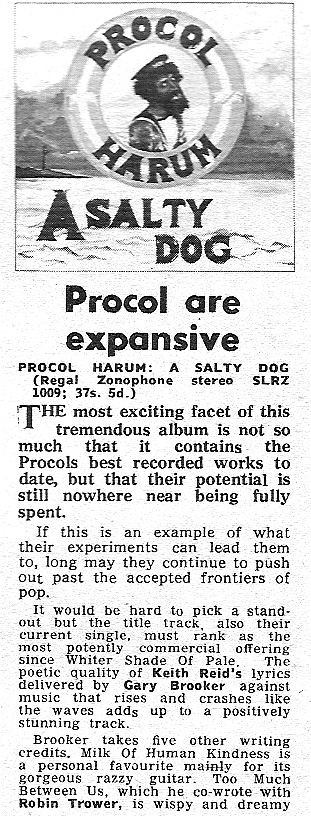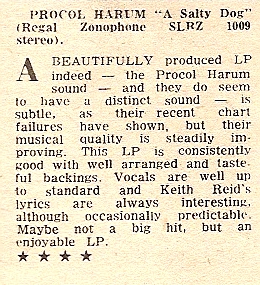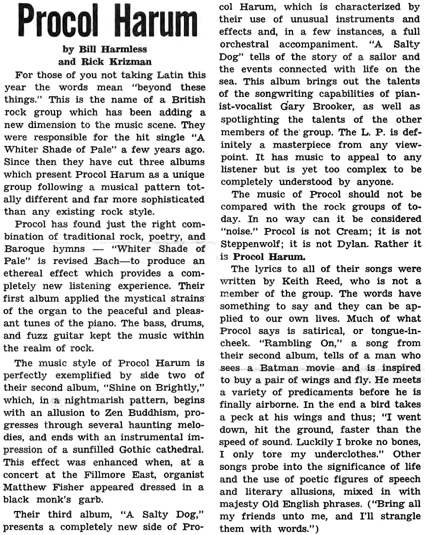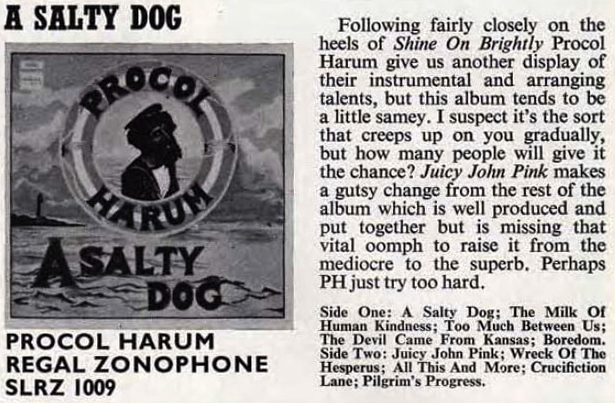A Salty Dog
Five contemporary album
reviews
 |
Procol are expansive: Nick Logan in New
Musical Express, 5 July 1969
The most exciting facet of this tremendous album is not so
much that it contains the Procols' best recorded works to date,
but that their potential is still nowhere near being fully spent.
If this is an example of what their experiments can lead them
to, long may they continue to push out past the accepted
frontiers of pop.
It would be hard to pick a stand-out but the title-track, also
their current single, must rank as their most potently commercial
offering since Whiter Shade of Pale. The poetic quality of
Keith Reid's lyrics delivered by Gary Brooker against music that
rises and crashes like the waves adds up to a positively stunning
track.
Brooker takes five other writing credits; Milk of Human
Kindness is a personal favourite, mainly for its gorgeous
razzy guitar. Too much Between Us, which he co-wrote with
Robin Trower, is wispy and dreamy ... (this is where our
scan ends) ... with shades of Incredible
String Band in the harmonies. The Devil Came from Kansas
has a distinct country feel with Barrie Wilson's powerful
drumming behind a piano running rife. All This and More is
nearer the old Procols.
Boredom, by Brooker and Matthew Fisher, has the latter
featured strongly on marimba with a pretty calypso lilt making it
one of the most appealing songs.
Fisher on his own has two entries, stand out being Wreck of
the Hesperus with a complex arrangement for piano and strings
that spins like whirlpools of water and has a charm and
prettiness little found in today's pop.
The album also marks the emergence of Trower as a writing
force. His two songs include Juicy John Pink, a strident
rock blues with shades of John Lee Hooker. Other titles: Crucifiction
Lane, Pilgrim's Progress
|
Disc,
July 1969
Ever since A Whiter Shade of Pale (probably one of the
best singles ever made) Procol Harum have been steadily gaining
devotees all around the world. With A Salty Dog they
return on probably the most satisfying album they've made yet.
It's above all heavy – the word could have been invented
with Procol in mind – and still with those rolling, soaring
Gary Brooker / Keith Reid songs, with those strange lyrics which
taken cold are meaningless but taken in the context of the songs
still convey a whole world of atmosphere and feeling. The title
track is perfection, and the others don't fall far short.
 |
Record Mirror, 12 July 1969
A beautifully produced LP indeed – the Procol Harum sound
– and they do seem to have a distinct sound – is
subtle, as their recent chart failures have shown, but their
musical quality is steadily improving. This LP is consistently
good with well arranged and tasteful backings. Vocals are well up
to standard and Keith Reid's lyrics are always interesting,
though occasionally predictable. Maybe not a big hit, but an
enjoyable LP.
(four stars)
|
 Procol
Harum
Procol
Harum
Bill Harmless and Rick Krizman
'... a
Procol review I wrote for my high school newspaper in
1969, in Kansas City'
For those of you not taking Latin this year
the words mean [sic] ‘beyond these things.’ This is the name of a British rock
group which has been adding a new dimension to the music scene. They were
responsible for the hit single A Whiter Shade of Pale a few years ago.
Since then they have cut three albums which present Procol Harum as a unique
group following a musical pattern totally different and far more sophisticated
than any existing rock style.
Procol has found just the right combination
of traditional rock, poetry, and Baroque hymns — Whiter Shade of Pale is
revised Bach—to produce an ethereal effect which provides a completely new
listening experience. Their first album applied the mystical strains of the
organ to the peaceful and pleasant tunes of the piano. The bass, drums, and fuzz
guitar kept the music within the realm of rock.
The music style of Procol Harum is perfectly
exemplified by side two of their second album, Shine on Brightly, which,
in a nightmarish pattern, begins with an allusion to Zen Buddhism, progresses
through several haunting melodies, and ends with an instrumental impression of a
sun-filled Gothic cathedral. This effect was enhanced when, at a concert at the
Fillmore East, organist Matthew Fisher appeared dressed in a black monk's garb.
Their third album, A Salty Dog,
presents a completely new side of Procol Harum, which is characterized by their
use of unusual instruments and effects and, in a few instances, a full
orchestral accompaniment. A Salty Dog tells of the story of a sailor and
the events connected with life on the sea. This album brings out the talents of
the song-writing capabilities of pianist-vocalist Gary Brooker, as well as
spotlighting the talents of the other members of the group. The LP is definitely
a masterpiece from any viewpoint. It has music to appeal to any listener but is
yet too complex to be completely understood by anyone.
The music of Procol should not be compared
with the rock groups of today. In no way can it be considered ‘noise’. Procol is
not Cream; it is not Steppenwolf; it is not Dylan. Rather it is Procol Harum.
The lyrics to all of their songs were written
by Keith Reed [sic], who is not a member of the group. The words have something
to say and they can be applied to our own lives. Much of what Procol says is
satirical, or tongue-in-cheek. Rambling On, a song from their second
album, tells of a man who sees a Batman movie and is inspired to buy a pair of
wings and fly. He meets a variety of predicaments before he is finally airborne.
In the end a bird takes a peck at his wings and thus; ‘I went down, hit the
ground, faster than the speed of sound. Luckily I broke no bones, I only tore my
underclothes.’ Other songs probe into the significance of life and the use of
poetic figures of speech and literary allusions, mixed in with majesty Old
English phrases. (‘Bring all my friends unto me, and I'll strangle them with
words.’)
Thanks, Rick
 |
Following fairly
closely on the heels of Shine on Brightly Procol Harum give us
another display of their instrumental and arranging talents, but this
album tends to be a little samey. I suspect it's the sort that creeps up
on you gradually, but how many people will give it the chance? Juicy
John Pink makes a gutsy change from the rest of the album which is
well produced and put together but is missing that vital oomph to raise
it from the mediocre to the superb. Perhaps PH just try too hard.
(Beat Instrumental, August 1969) |
More reviews of Procol Harum albums
More reviews of this particular album


 Procol
Harum
Procol
Harum 